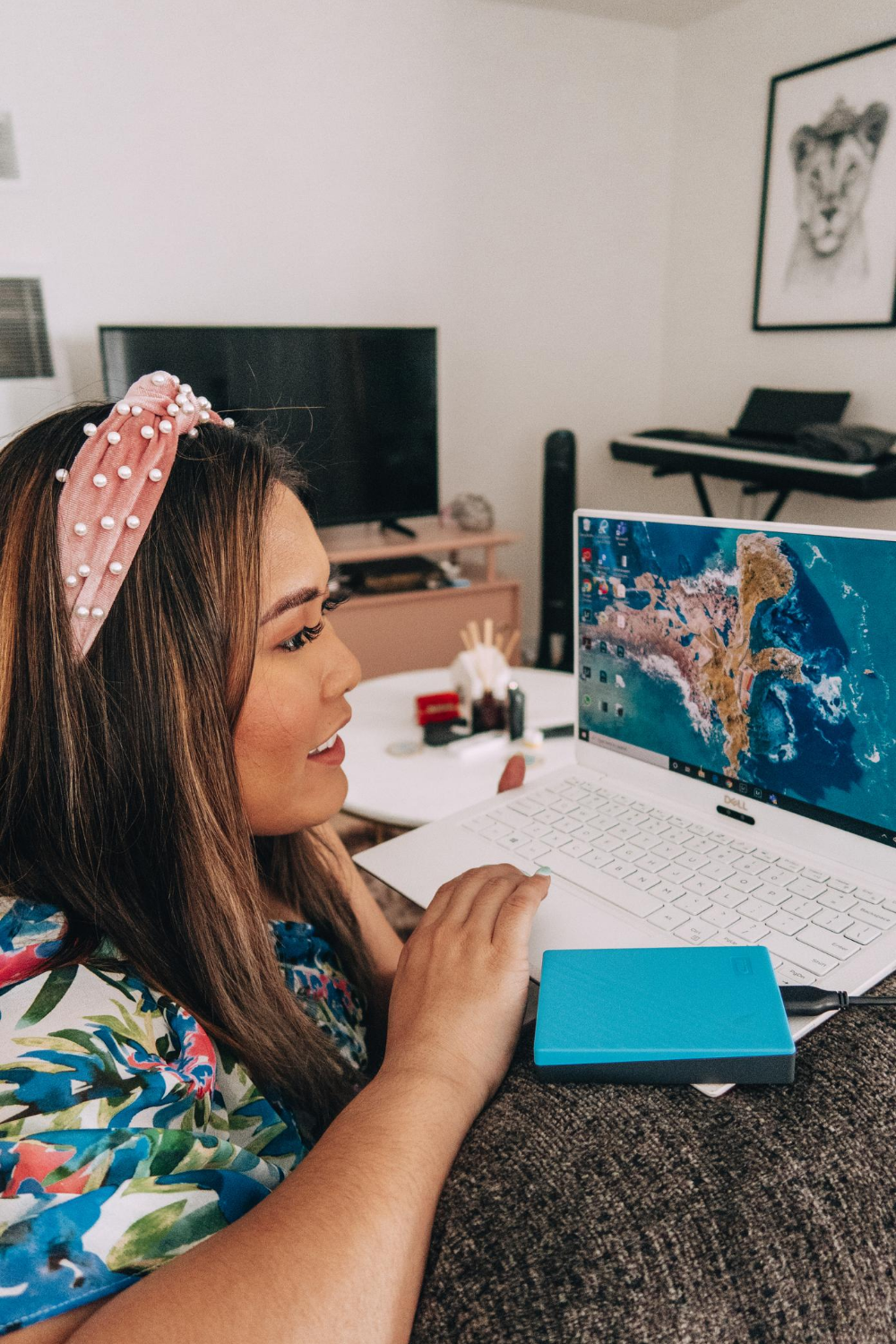
category
10 Proven Ways to Spot Influencer Scams & Brands that Prey on Small Influencers
Influencer scams are inevitable! Have you ever gotten a comment or DM from a “brand” asking you to collab and be their brand ambassador? Odds are, especially if you’re new to the influencer industry, you’re about to get scammed.
The influencer market is growing rapidly, and more and more nano and micro influencers are hungry and eager to look for collabs with brands to make income. At the same time, more and more brands and companies are growing their influencer marketing budget. But with both sides on the rise come POOR business ethics. MANY brands use their upper hand and knowledge of social media to take advantage of budding influencers, and unfortunately, a lot of them fall prey for these Instagram scams mainly because they don’t know any better.
If you’re new to become an influencer and you’re starting to dive into finding sponsorships on Instagram, I’m here to help you spot the red flags with Instagram scams, and what you can do to avoid it.
“”

10 Red Flags to Spot Influencer Scams
1. “DM to Collab” Comments
Of all the Instagram scams to spot, this is probably the most common. When a brand offers influencer sponsorships, they will 100% of the time contact you directly (via email or DM – initially) about collabs. Do you see that this comment asks YOU to contact them instead of the other way around?

Chances are, these brands are using bot accounts to automate these comments every time you trigger any of the following criteria: (1) using a specific hashtag, or (2) comment or follow a specific account. There’s nothing legitimate about these “DM to collab” comments, which brings me directly to my next point…
2. Messages Aren’t From Their Main Account
Using bots to automate likes, comments, DMs, story responses to drive engagement violates Instagram’s terms of use. So in order to protect their brand accounts’ good standing, they use multiple bot accounts to achieve their goal of finding influencers to promote their products. Why? Because these accounts get shut down by Instagram often. If the brand continues to spend money automating reaching out to influencers offering collabs, this means it’s working for them and they’re okay with continuing to send influencer scams. That’s very fishy.
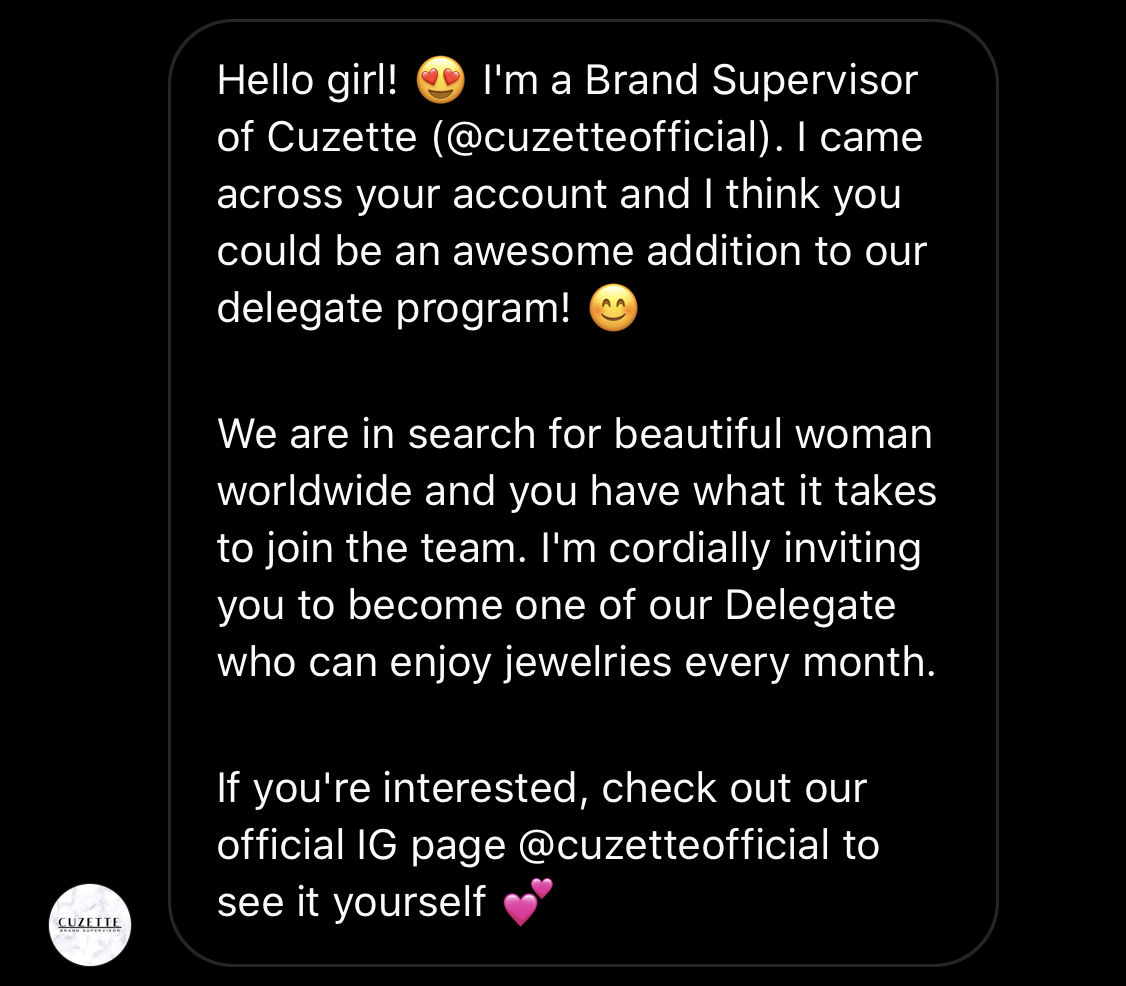
If a brand has to go through these lengths to market their product, they’re definitely Instagram scams and I would question their business ethics immediately. This should never be a brand you would want to represent.
Also, what is up with the emojis? This is so unprofessional.
3. They Offer Ambassadorship Right Away
Now, don’t get me wrong here. Being a brand ambassador is not a bad thing when you first start landing influencer sponsorships (I’ve done them), but there is a right way of doing so, and you can opt for one without getting scammed.
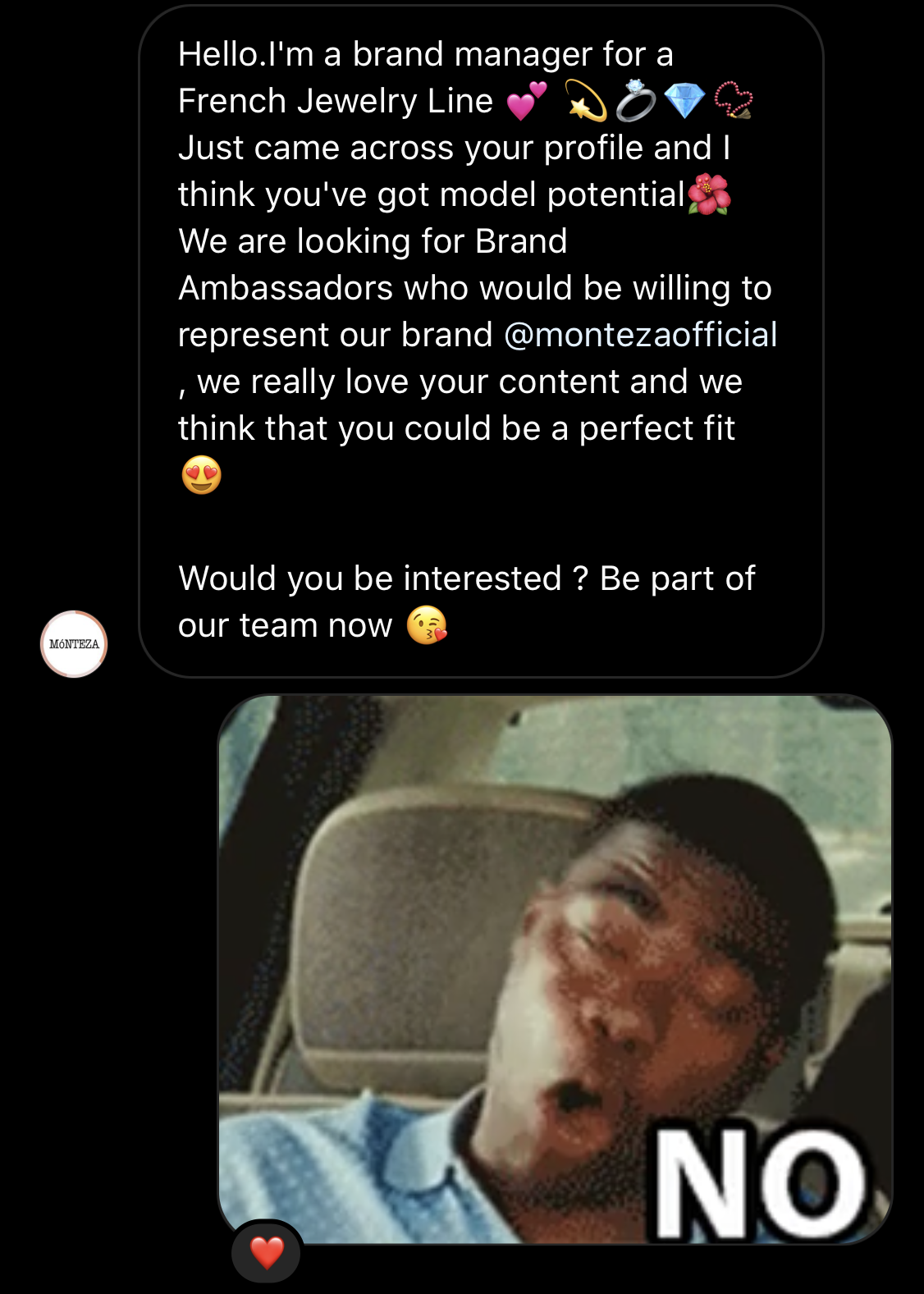
I get these messages almost daily. Even when I pitch for influencer sponsorships, many brands offer this, so they’re not all Instagram scams. However, what I’ve noticed with these “brand ambassadorships” is that brands that reach out to you on DMs (or sometimes email) will offer them immediately. This has nothing to do with the quality of your social media content or engagement. Heck, I even have friends (who aren’t influencers) who have fallen for this ploy and got excited that a brand decided to work with them… that is, until I told them it was a scam.
4. They Ask You to Buy the Product Up Front with their Discount
RULE OF THUMB LADIES AND GENTLEMEN: NEVER pay for a product to collab with a brand, unless they agreed (in writing) to reimburse you. Even when they give you a code to purchase, but still have to pay for shipping. If a brand really wants to offer you sponsorships on Instagram, they should, at the very least, offer the product as a gift. Otherwise, you’re nothing more than a customer.


If the brand offers affiliate programs, where influencers have the chance to earn commission off sales, it’s only okay if it makes sense for your brand or if you already use the product regularly. Even so, this “ambassadorship” has more ROI for the brand than it does for you. If anything, at the very least, you just made them a sale.
5. The Brand Emails You From a Free Email Account
One of the ways I vet the legitimacy of a brand offering sponsorships on Instagram is by first checking their email address and the signature at the end. It’s an immediate red flag for me when the person reaching out to me is using a free email account (aka gmail, outlook, yahoo, etc.). If a brand has product to sell and a website to sell it on, they should have an official email account.
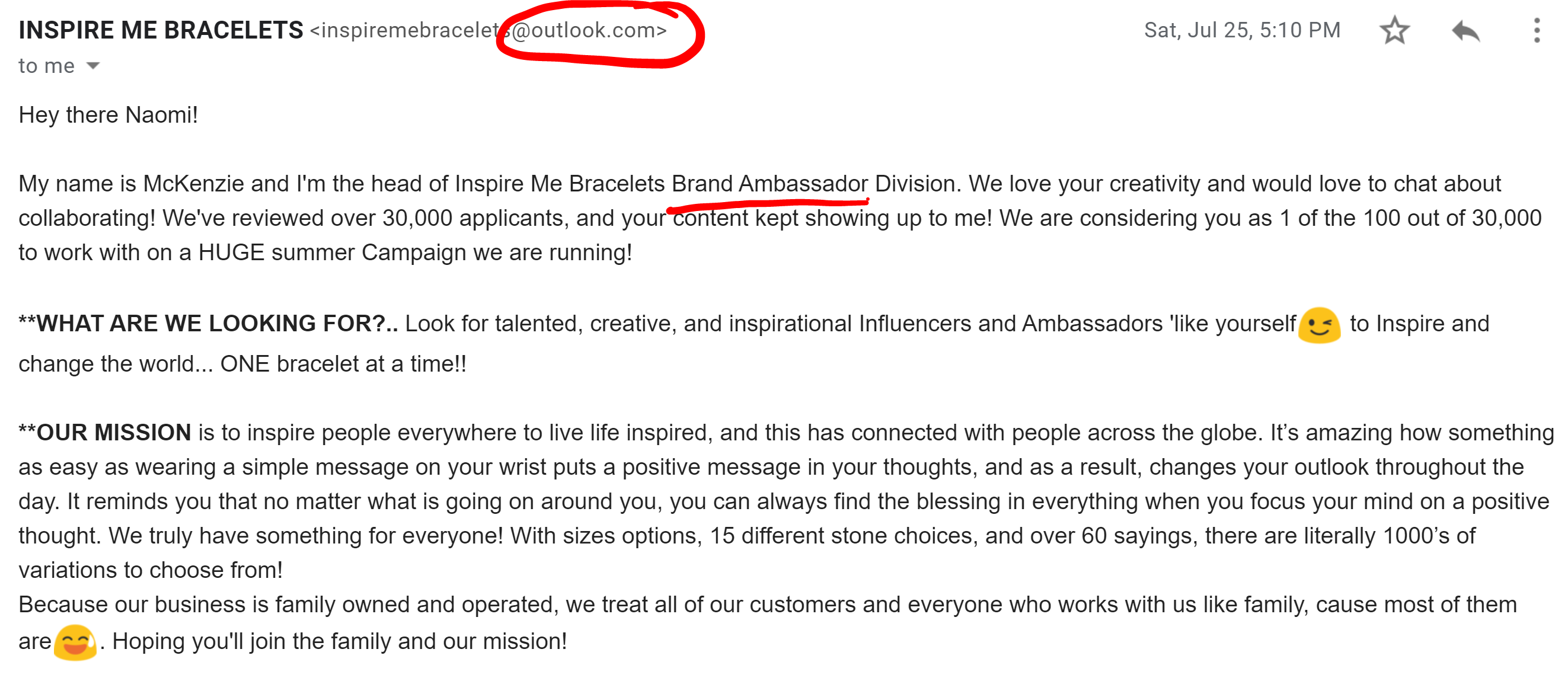
Granted, small businesses who have their business on Etsy or Amazon may be an exception, it’s still presents as a fishy offer. It’s also been a trend over the past few years for hackers to pretend to be an official “Instagram” or “Facebook” agent trying to attain your account email and password. It’s crazy, because now, I’ve gotten hacker emails pretending to be brands! I’m sure they’re trying to use my mailing and personal information for their benefit.
Moral of the story is… VET THE EMAILS. Research the person emailing you.
6. The Brand’s Instagram has Fishy Numbers (aka Fake Followers)
If you’ve never heard of the brand before, this should be A MUST to vet when you’re doing your research. If the brand isn’t verified by Instagram, but has thousands or hundreds of thousands of followers, check their engagement: like count, comments, and even the quality of those numbers. When you find ghost or bot engagement, TURN THE OTHER WAY. Chances are, they will take advantage of you.
I’ve had one brand reach out to me a year ago offering ambassadorship and dropping designer names they’ve worked with, even a big known agency in their signature. But when I checked out their credentials, their social media engagement were all fake (100k followers with <200 likes… ummm WHAT!). It’s crazy because a lot of people have been getting this same email (they’ve emailed me 10x now I think) and opting for the “partnership”. And because they’ve scammed so many girls on Instagram, they were able to build their social proof with photos and semi-real engagement.
Let’s not enable more brands to do this.
7. The Brand’s Feed Quality is Very Poor
This is not really that big of a red flag to me because there are a lot of legitimate brands who are just barely entering the social media space who may need your help with content creation. But there will be brands who use stock photos to promote what they’re selling, and you need to use your common sense to see if they’re influencer scams.
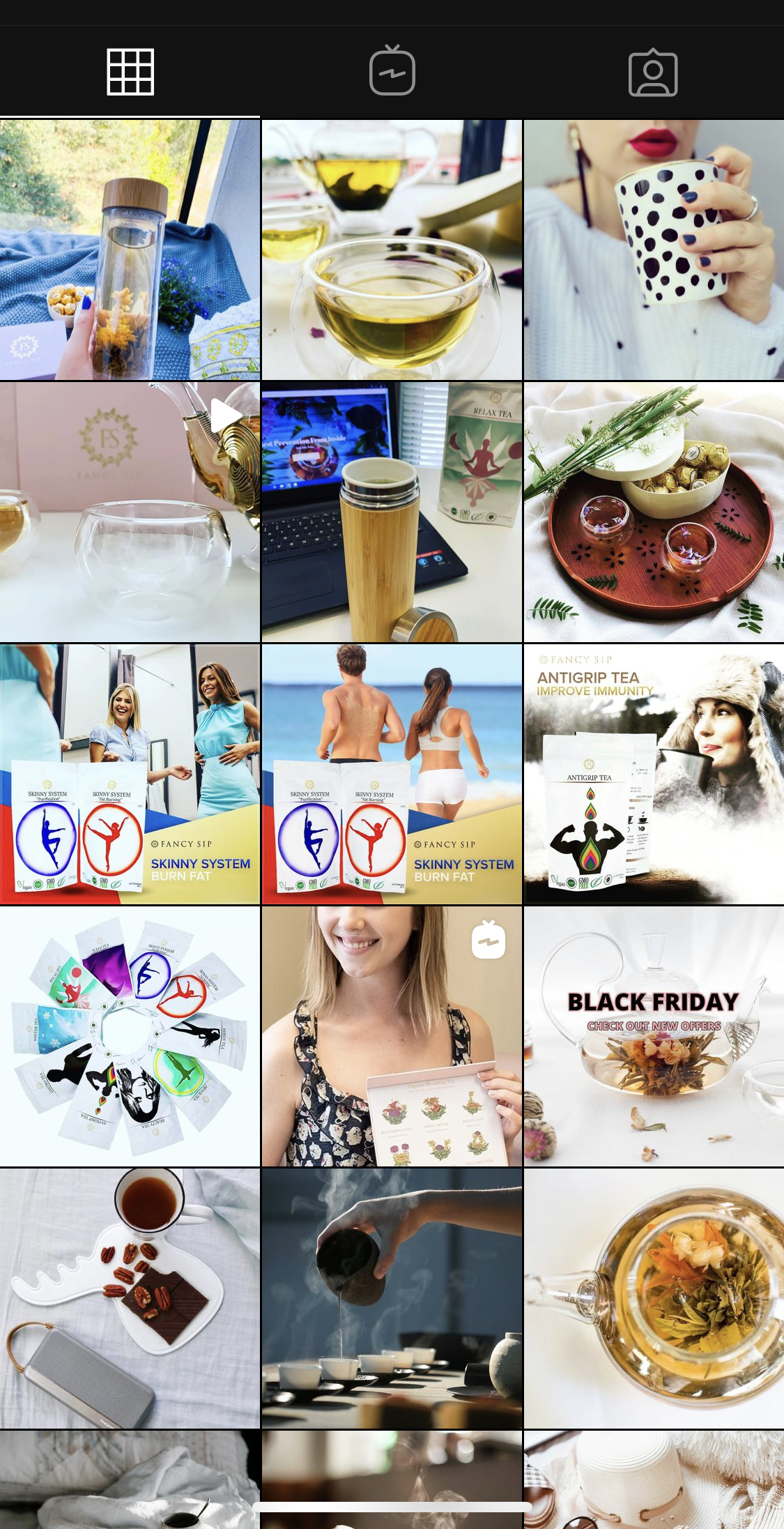
If they’re using stock photos and barely have shots of their actual products, chances are, they’re probably very cheap quality or a knockoff of a different brand’s product. If you end up working with this brand and a follower buys from your promotion who ends up hating the product, it could destroy your integrity as an influencer.
8. No Contract or Written Agreement
Don’t move forward with influencer sponsorships without guaranteeing the TERMS of your collabs in writing. The more official the document (aka a contract), the better. This is usually something a brand or a PR agency will provide, and it is your job to make sure you read its entirety to ensure you are protected.
If a brand does not provide this (usually if they’re gifted or an event invite, wherever there is no monetary compensation), you have the option to proceed, but I still highly recommend you ask for one. When they ask you to provide them with a contract, let them know that you are hiring a lawyer to write this and that this requires a fee for their time.
9. They Are Using an Ad to Look for Ambassadors
If the company is using their marketing budget on Facebook or Instagram ads to find influencers to sponsor, chances are, the brand is making a lot of money in sales from their ambassadors. Ads are not cheap, so for them to use their ad spend to find ambassadors only mean that influencers continue to agree to partner with them this way. I’m sorry to say, but unless you’re a macroinfluencer or a celebrity, they will not pay you for partnerships.
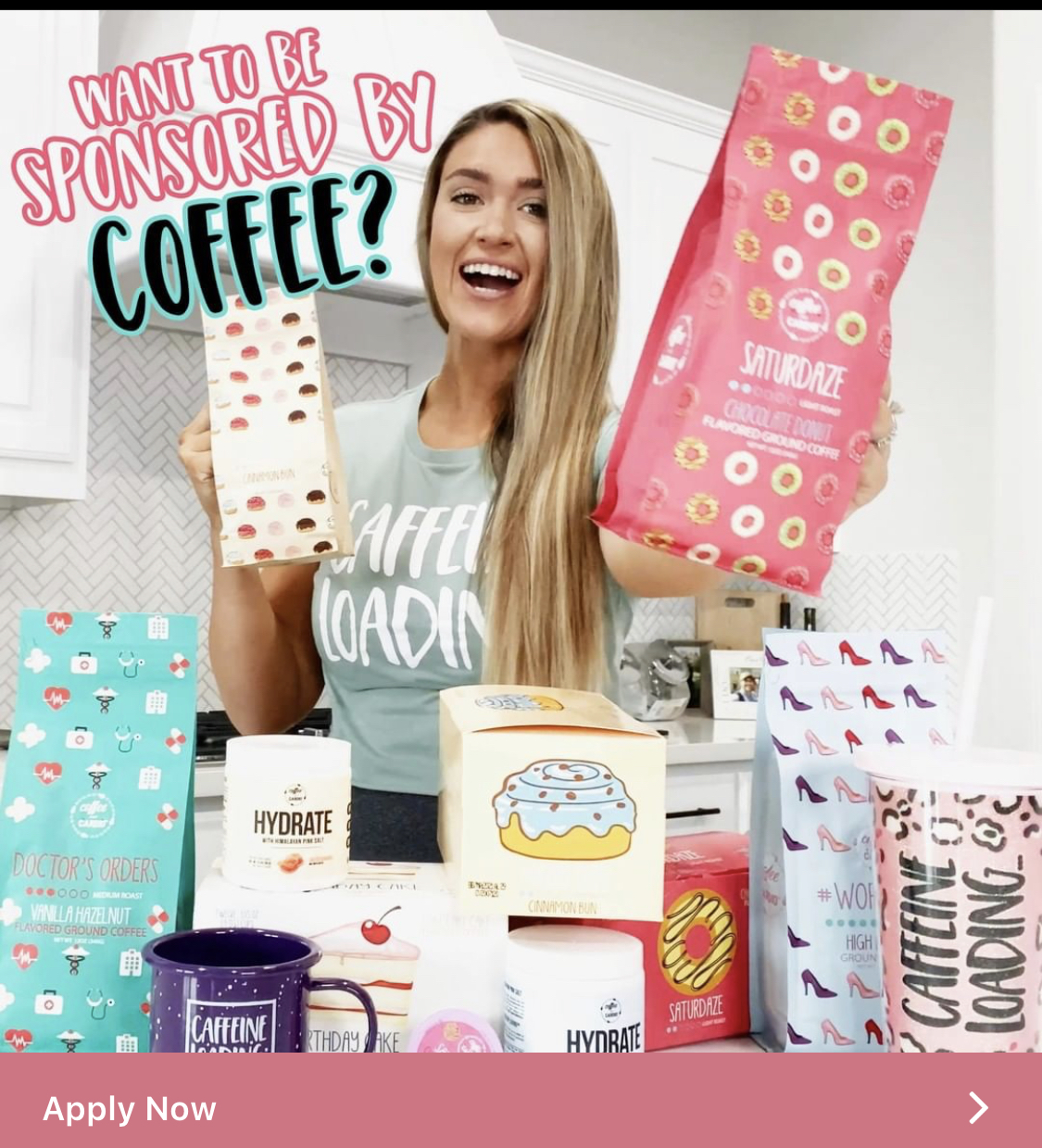
When scouting for influencers for a campaign, brands will spend their time looking for the right influencers who fit their brand and their campaign. They will, then, professionally reach out to those influencers to offer collabs. Why? They value the value you put out there, and they want to build good rapport with you.
10. The Entire Conversation Lives in the DMs
My rule of thumb when a brand reaches out to me in the DMs is I immediately ask them to move the conversation over to my email and provide my email. If a brand really wants to work with you, they will be happy to take the extra step. Brand managers and PR professionals usually reach out via DM when you’ve interacted with them on social media, or if they need your email address.
What You Can Do
One of the main reasons why I was so passionate about creating my signature online course, the SponMaster is to help influencers navigate through sponsorships on Instagram, TikTok and beyond, find the right collabs, and avoid falling for these influencer scams.
VET THE BRAND’S WEBSITE AND SOCIAL MEDIA ACCOUNT – Do your research. Look up the contact’s LinkedIn. Verify if their social media buys engagement.
LOOK AT WHO IS FOLLOWING THEM AND WHOM THEY’VE COLLABED WITH – Usually if you have a few influencers you recognize on their profile that follow them, it’s enough to vet legitimacy. I also do the extra mile of looking at who has tagged them in photos and see if the quality matches with your content.
GET A SECOND OPINION – Finding a community of influencers usually helps a lot! Especially if you’re in the same niche, you are most likely receiving the same influencer sponsorships offers.
TRUST YOUR GUT – If it’s fishy to you, then it most likely is. Trust what your gut is telling you, and know your worth!
If you want, help me populate a list of blacklisted brands I’ve created so we can help budding influencers to avoid falling for influencer scams.
Access the Influencer Scam Brand Blacklist Google Doc
If you still don’t feel as confident in finding the right partnerships for you, landing collabs that are worthwhile or even where to get started, check out the SponMaster! A self-paced program that won’t only help you secure the bag in brand collaborations, consistently be on-demand with repeat brand partners, but also learn how to build your business of influence like the CEO you are meant to be! After taking this course, you’ll
-
- Have all the tools and strategies I use every single day to land 4-5 figure brand partnerships for myself and the influencers I manage
- Become fully-trained to know how to get your name in the running to collaborate with your dream Fortune 500 brands
- Know exactly how to price yourself as a person of influence LIKE A PRO
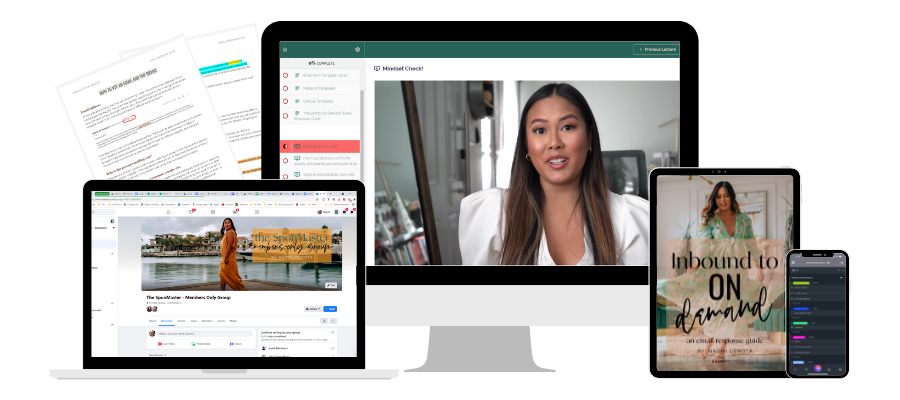
SAVE THIS POST:


